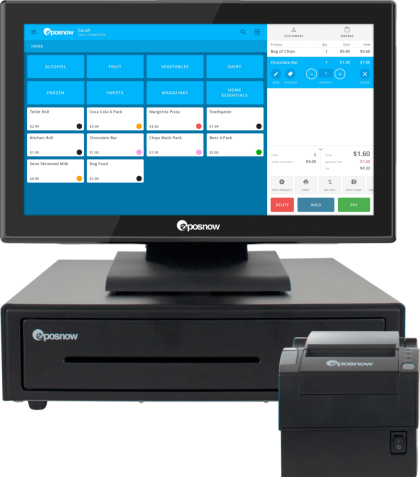Types Of Retail Stores: What Are They?
US retail sales hit $1.8 trillion in the second quarter of 2022 [1].
So if you're thinking about opening a retail store, you could be in for a very profitable venture. But with so many types of retail stores out there, it can be tough to decide which one is right for you.
In this blog post, we'll take a look at the different types of retail stores so you can make an informed decision about which one is right for your business. We'll look at 12 different types of retail stores, why they exist, and what types of products they sell.
Let's get started!
What is a retail store?
Before we dive into the different types of retail stores, it's important to understand what a retail store is. A retail store is a business that sells products or services to customers. Retail stores can be physical stores, online stores, or a combination of both.
Physical retail stores are the most common type of retail store. They are businesses that have a physical location where customers can come in and purchase products. Online retail stores are businesses that sell products online without a physical location. And hybrid retail stores are businesses that have both a physical location and an online presence.
Now that we've defined what a retail store is let's take a look at the different types of retail stores out there.
Specialty stores vs. department stores
The first distinction we'll make is between specialty stores and department stores. Specialty stores are businesses that sell a specific type of product, while department stores are businesses that sell a variety of products.
Specialty stores exist because they can offer a higher level of expertise on the products they sell. They also usually carry a wider selection of products than department stores. And because they focus on a specific type of product, they can offer customers a more personalized shopping experience.
Department stores, on the other hand, exist because they can offer a one-stop shopping experience for customers. Customers can come to a department store and find everything they need, all in one place. Department stores also usually offer lower prices than specialty stores because they buy products in bulk and sell them at a discount.
10 types of retail stores
1. Apparel stores
Starting strong on our types of retail stores blog is an apparel store. This store focuses on selling clothing and accessories. Clothing stores come in all shapes and sizes, from small boutiques and thrift shops to large department stores and warehouse stores.
Tips for opening an apparel store:
-
Start by finding the right location: Your business location will be one of the most important factors in your success.
-
Focus on customer service: Excellent customer service will be key to keeping your customers coming back. Train your employees on how to provide outstanding customer service.
-
Build up an inventory of stylish clothing and accessories: To succeed in this business, you'll need to offer products that are stylish and in demand. Stay up-to-date on the latest fashion trends so you can stock your store accordingly.
For more information on opening retail stores, check out our retail-focused blogs.
2. Furniture stores
Furniture stores are retail businesses that sell furniture and home furnishings. These stores can range from small local shops to large national chains. And they can sell all types of furniture, from sofas and chairs to bedroom sets and dining room tables.
Tips for opening a furniture store:
-
Perform market research: It's important to know who your target market is and what type of furniture they are looking for. This will help you choose the right type of furniture to sell in your store.
-
Put together a strong business plan: A well-crafted business plan will help you secure the funding you need to open your store. It will also give you a roadmap for success.
-
Source and purchase brilliant inventory: In order to succeed in this business, you'll need to offer high-quality furniture at competitive prices. Work with reliable suppliers to get the best products for your store.
3. Discount stores
Everyone loves a bargain. And that's what makes discount stores so popular. These types of retail stores sell products at lower prices than other stores.
Discount stores can be small, local businesses or large national chains. And they sell all types of products, from clothes to groceries.
Some popular discount stores in the US include Dollar General, Family Dollar, 99 Cents Only Stores, and Big Lots.
Tips for opening a discount store:
-
Select a catchy name for your discount store: Discount stores all have one thing in common: their name. Choose a name for your store that is catchy and will attract customers. Your discount store name should be easy to remember and should reflect the affordability of your products.
-
Visit competitor discount stores: Take some time to visit other discount stores in your area. See what they are doing right and wrong. Use this information to improve your own store.
-
Create an attractive store layout: Customers should be able to find what they are looking for quickly and easily in discount stores. Create a store layout that is organized and easy to navigate.
-
Stock up on affordable products: Discount stores are all about offering products at a lower price than other stores. Work with suppliers to get the best deals on products. You can also offer used or second-hand products to keep costs down.
4. Convenience stores
A convenience store is a type of retail store that is open long hours and sells a wide variety of items, such as food, snacks, drinks, and cigarettes.
Convenience stores are often located near busy areas, such as bus stations and highway exits.
Convenience stores also tend to be open much later than regular grocery stores as well. This makes them a convenient option for people who need to buy items outside of regular store hours and results in increased foot traffic and sales for the business.
Tips for opening a convenience store:
-
Choose a strategic location: The success of your store will largely depend on its location. Look for a spot that is easily accessible and near high-traffic areas.
-
Offer a wide range of products: Customers should be able to find everything they need in your store. Stock up on items such as food, snacks, drinks, and cigarettes.
-
Extend your store hours: Convenience stores are all about convenience. So make sure your store is open long hours to accommodate customers. For example, you could be open 24 hours a day.
TIP: Find out how our grocery store POS system can help grow your business. From simple stock control to automated purchase orders.

One system at the core of your business
Whether you run a specialty store selling sporting goods, a flower shop, a clothing boutique, or a grocery store, build it for success with a dedicated retail POS system.
-
Multi-site and omnichannel store management, all in one place
-
Detailed sales analytics that reveals top-performing products and employees
-
Stock counts and drops that update in real-time
-
Integrate with a fully loaded eCommerce platform that syncs with your Epos Now till
-
Choose from a suite of business automation apps, from marketing to bookkeeping to payroll.
5. Drug stores/pharmacists
A drug store also called a pharmacy, is a type of retail store that sells medications and other health-related products. Drug stores can be small, local businesses or large national chains. And they are typically found in high-traffic areas, such as shopping malls and hospitals.
Tips for opening a drug store:
-
Decide if you'll start a new one or buy an existing business: One option is to start a new drug store from scratch. This will require more time and money, and you'll have to build up a customer base from scratch. Another option is to buy an existing drugstore. This can be more expensive, but you'll already have a customer base, and you won't have to wait as long to start turning a profit.
-
Get the necessary licenses and permits: You'll need to get a license to sell medications. Contact your local health department or state board of pharmacy for more information.
-
Source products from reliable suppliers: In order to sell high-quality products, you'll need to work with reliable suppliers. Research different suppliers and find ones that offer the best products at the best prices.
6. Supermarkets/grocery stores
A supermarket is a large, self-service store that sells a wide variety of food and household products. Supermarkets are typically found in high-traffic areas, such as busy city streets or major highways. Similarly, a grocery store is also a retail stores that sell food and household products. However, a it's typically smaller than a supermarket and found in more rural areas.
Tips for opening a supermarket/grocery store:
-
Determine Your Grocery Store Business Costs: Before you open your doors, you'll need to have a clear understanding of your start-up costs. This will help you determine how much money you'll need to get your business off the ground.
-
Choose your business structure: When starting a grocery store, you'll need to choose the legal structure of your business. This will determine things like how you're taxed and how much liability you have.
-
Get the necessary licenses and permits: You'll need to get a business license and other permits in order to operate your store. In the US, you'll need to get a food handler's permit.
7. Department stores
Department stores are a type of retail store that sells a wide variety of items, including clothing, furniture, home decor, and electronics. Department stores are usually large stores with many different departments - hence their name.
-
Check out financing options: One of the first things you'll need to do when opening a department store is to find the right financing. This can be in the form of loans, investment capital, or even personal savings. Unlike smaller retail stores, department stores can be quite expensive to set up. So it's important to have a solid plan for how you'll finance your business.
-
Get the necessary licenses and permits: Department stores tend to require more licenses and permits than other types of retail stores. This is because you'll likely be selling a wide variety of items, such as clothing, electronics, and home decor.
-
Find smaller retail businesses to partner with: A department store works with lots of different small businesses to provide the products that they sell. So it's important to establish relationships with these businesses early on. You can find small businesses to partner with by attending trade shows or searching online directories.
8. Barbershop
A barber shop is a type of business that offers hair-cutting and other grooming services. Barber shops are usually small businesses with a limited number of employees.
Some tips for starting a barber shop include
-
Decide whether you want to go mobile or have a brick-and-mortar shop: One of the first decisions you'll need to make when starting a barber shop is whether you want to be mobile or have a physical location. There are pros and cons to both options, so it's important to weigh your options carefully. If you decide to go mobile, our payment processing services can help you take payments on the go.
-
Create a barber business plan: Once you've decided on the type of barbershop you want to start, the next step is to create a business plan. This will help you map out your business goals and objectives. It will also be useful when it comes time to apply for financing.
-
Equip your shop: Barbershops require some specialized equipment, such as barber chairs and mirrors. You'll also need to make sure you have a supply of haircare products.
Our barber shop POS allows you to build a menu of your services for a quicker checkout process, review reports tracking profit, trending styles or top-performing employees in real-time or over a set time period and master stock levels update with each product and service sold. Find out more!
9. Electronics stores
An electronics store is a type of retail store that specializes in selling electronic devices and gadgets. These can be small, specialized stores or large department stores with a dedicated electronics section. Some electronic giants include Best Buy, Walmart, and Target.
When starting an electronics store, consider the following tips.
-
Create a business plan: One of the first things you'll need to do when starting an electronics store is creating a business plan. This document will map out your business goals and objectives. It will also be useful.
-
Financing your store: Electronics stores can be expensive to set up, so it's important to have a solid plan for financing your business. This may include loans, investment capital, or even personal savings.
-
Consider going online: With technology becoming more and more commonplace in society, many electronics stores are now going online. This can be a great way to reach a wider audience and save on overhead costs.
Our pos software for electronics store allow you to manage warranties and easily offer refunds and exchanges, as well as grow an omnichannel business, and easily create an online store designed to convert.
10. Car wash
A car wash is a type of business that offers cleaning services for cars and other vehicles. Car washes can be self-service, full-service, or express.
When starting a car wash, consider the following tips.
-
Decide on the type of car wash you want to start: The first step in starting a car wash is to decide on the type of business you want to create. There are three main types of car washes: self-service, full-service, and express.
-
Conduct market research: It's important to understand the car wash industry and your local market before starting your business. This research will help you determine the feasibility of your business and identify any potential competition.
-
Create a business plan: Once you've done your market research, the next step is to create a business plan for your car wash. This document will outline your business goals and objectives. It will also be useful when it comes time to apply for financing.
Final thoughts
So there you have it. Our top ten retail stores for entrepreneurs, from specialty stores to retail outlets. We hope this list has given you some ideas and inspiration for starting your own business. Once you know which retail store to open, check out our retail strategies blog to start planning.
Remember, the most important thing is to choose a business that you're passionate about. With hard work and dedication, you can turn your dream into a reality. Good luck!
Talk to our team of experts about how a retail POS can help your business!



